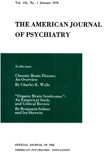FURTHER EXAMINATION OF DIAGNOSTIC CRITERIA IN SCHIZOPHRENIC ILLNESS AND PSYCHOSES OF INFANCY AND EARLY CHILDHOOD
Abstract
1. With the exception of degenerative and epileptic psychoses, there exists in the literature a tendency to group together psychoses of infancy and early childhood, which may represent different illness processes, or to differentiate between them in accordance with concepts which are difficult to apply clinically.
2. Autistic defenses are generally characteristic of these psychoses. But this does not justify a failure to differentiate between types which can be distinguished clinically. Such differentiation would appear advisable until knowledge concerning etiology increases.
3. It is suggested that the diagnosis of "autistic psychosis" be applied only to cases meeting Kanner's criteria of early infantile autism.
4. The diagnosis of "schizophrenic illness" should be applied to cases with onset after age one and with a picture characterized principally by loss of affective contact with reality and autistic thinking.
5. Psychoses in children with retarded motor development, or in whom intellectual performance, although atypical for any age level, is below normal functioning in all areas, would best be classified for the present in a separate group as psychoses in mentally defective children.
6. With the exception of rarely occurring affective psychoses in this age group, and with the exception of organic and epileptic psychoses, most psychoses of infancy and early childhood will meet the criteria of one of these types. Cases characteristic of 3 types have been presented.
7. The degree of impairment of communication present in these psychoses constitutes a significant prognostic factor.
Access content
To read the fulltext, please use one of the options below to sign in or purchase access.- Personal login
- Institutional Login
- Sign in via OpenAthens
- Register for access
-
Please login/register if you wish to pair your device and check access availability.
Not a subscriber?
PsychiatryOnline subscription options offer access to the DSM-5 library, books, journals, CME, and patient resources. This all-in-one virtual library provides psychiatrists and mental health professionals with key resources for diagnosis, treatment, research, and professional development.
Need more help? PsychiatryOnline Customer Service may be reached by emailing [email protected] or by calling 800-368-5777 (in the U.S.) or 703-907-7322 (outside the U.S.).



